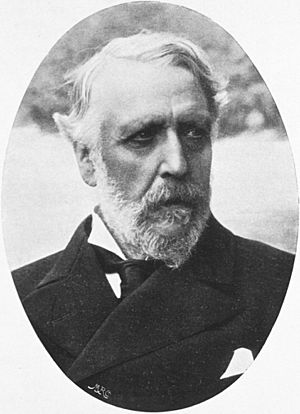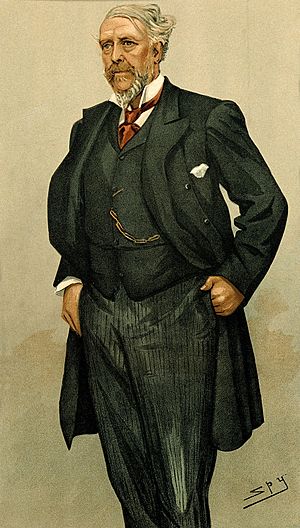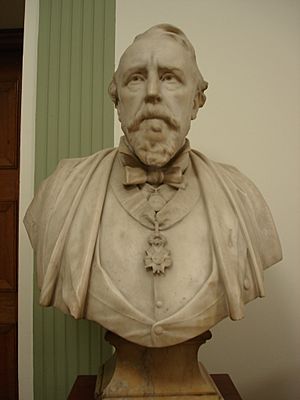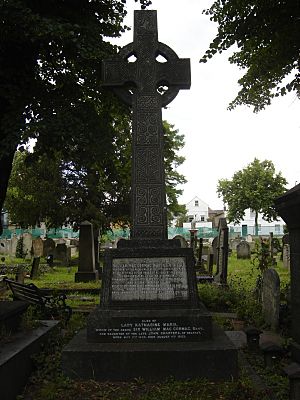William MacCormac facts for kids
Quick facts for kids
Sir William MacCormac, 1st Baronet
|
|
|---|---|

Sir William MacCormac, 1st Baronet
|
|
| Born |
William MacCormac
17 January 1836 Belfast, Ireland
|
| Died | 4 December 1901 (aged 65) Bath, Somerset, England
|
| Education | Royal Armagh School, Queen's University |
| Medical career | |
| Profession | Surgeon |
Sir William MacCormac, 1st Baronet (born January 17, 1836 – died December 4, 1901) was a very important British surgeon. He lived in the late 1800s and early 1900s.
MacCormac strongly believed in using clean methods during surgery. These methods were suggested by another famous surgeon, Joseph Lister. Sir William also helped soldiers during wars, like the Boer War. He was a big supporter of the Royal Army Medical Corps, which is the medical part of the army. He was one of the most honored surgeons in Britain and even worked for King Edward VII.
Contents
Early Life and Family
William MacCormac was born in Belfast, Ireland. His father, Dr. Henry MacCormac, was a well-known Irish doctor. His mother, Mary MacCormac, came from an important family.
Dr. Henry MacCormac traveled a lot. He always believed that fresh air helped prevent people from getting sick. The MacCormac family originally came from County Armagh.
Education and Training
William MacCormac studied medicine and surgery in Belfast, Dublin, and Paris. He earned degrees in arts, medicine, and surgery from Queen's University, Belfast. Later, he even became an examiner there, testing other students in surgery.
A Surgeon's Career
MacCormac started his medical practice in Belfast. He became a surgeon at the General Hospital there. In 1861, he married Katherine M. Charters and moved to London.
War Surgeon
In 1870, during the Franco-Prussian War, he was the chief surgeon for the Anglo-American Ambulance team. He was present at the Battle of Sedan. He also worked during the Turco-Servian War in 1876. Because of this experience, he became an expert on treating gunshot wounds.
Working in London
In 1881, he became an assistant surgeon at St Thomas' Hospital in London. For twenty years, he worked there as a surgeon, teacher, and consultant. In the same year, he helped organize a big medical meeting in London and was made a knight for his efforts.
He became a leader in the college of surgeons. He was elected president of the college several times, from 1896 to 1900. In 1897, he was given the special title of baronet. He was also appointed as a surgeon to the Prince of Wales. The Prince needed his help in 1898 after a knee accident. MacCormac was then given another high honor, the Knight Commander of the Royal Victorian Order.
Helping in the Boer War
When the Second Boer War started in 1899, MacCormac volunteered to go to South Africa. He worked as a consulting surgeon for the British forces. From November 1899 to March 1900, he saw a lot of action. He visited Kimberley and Ladysmith after they were freed from sieges. When he returned to Britain, he was honored again for his help in the war.
Later Life and Legacy
In February 1901, he became an honorary sergeant-surgeon to the new King, Edward VII. In June 1901, he received an honorary doctorate from the University of Glasgow. However, he had been ill since 1898 and had worked very hard. He passed away suddenly on December 4, 1901, in Bath. He is buried with his wife, Katherine Maria MacCormac, in Kensal Green Cemetery, London.
Family Connections
William MacCormac married Katherine Maria Charters in 1861. They did not have any children. However, he had many famous relatives. His nephew, Dr. Henry MacCormac, was a successful skin doctor. Henry's son, Sir Richard MacCormac, became a well-known architect.
Sir William MacCormac was also the uncle of Dr. John Farrell Easmon, a doctor from Sierra Leone. When MacCormac worked for Queen Victoria, he invited Easmon to be his assistant. Easmon was a brilliant student. But Easmon chose to work as a medical doctor in Freetown, Sierra Leone, and the Gold Coast instead. He later became the Chief Medical Officer of the Gold Coast in 1893.
Written Works
MacCormac wrote many important books and articles. He wrote about surgical operations and clean surgery methods. He also wrote works for the Red Cross. In 1900, he wrote an interesting book celebrating 100 years of the Royal College of Surgeons of England. This book included stories about all the leaders of the college up to that time.
Honors and Awards
Sir William MacCormac received many honors from Britain and other countries.
British Awards
- KCVO: Knight Commander of the Royal Victorian Order – given in 1898.
- KCB: Knight Commander of the Order of the Bath – given on November 29, 1900, for his help during the Second Boer War.
Awards from Other Countries
 : Officer of the Legion of Honour
: Officer of the Legion of Honour : Commander of the Order of the Dannebrog
: Commander of the Order of the Dannebrog : Commander of the Order of the Crown of Italy
: Commander of the Order of the Crown of Italy : Commander of the Order of Takovo
: Commander of the Order of Takovo : Order of the Crown
: Order of the Crown : Order of the Polar Star
: Order of the Polar Star : Order of Saint James of the Sword
: Order of Saint James of the Sword : Ritterkreuz of one of the Orders
: Ritterkreuz of one of the Orders : Order of Military Merit
: Order of Military Merit : Order of Medjidie
: Order of Medjidie
|
 | DeHart Hubbard |
 | Wilma Rudolph |
 | Jesse Owens |
 | Jackie Joyner-Kersee |
 | Major Taylor |




